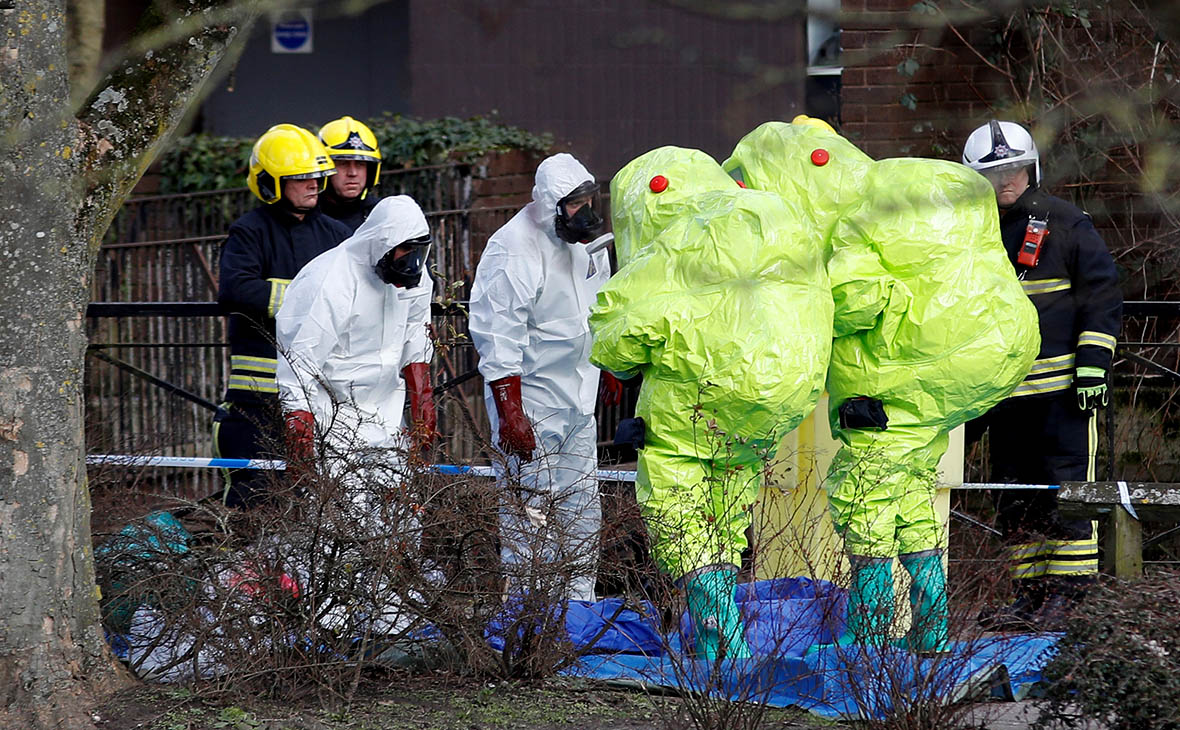
Investigators in chemical protection suits check the place where the Skripals were found.
Photo: Peter Nicholls / Reuters
On the website of the investigation, transcripts of the sessions are posted, where you can read the testimonies of police officers, experts, witnesses, and lawyers. The GRU poisoners left many electronic traces, which can be used to reconstruct the picture: intercepted phone conversations of Mishkin and Chepiga with coordinator Denis Sergeev, who did not go with them to Salisbury but stayed in London, greatly helped the investigation.
The transcripts of the testimonies given to the court paint a detailed picture of the methods of the GRU agents, and it becomes clear how the poisoners from the GRU unit "29155" acted, operating under the fictitious names Alexander Petrov, Ruslan Boshirov, and joined by Sergey Fedotov.
The real names of the executors — Anatoly Chepiga, Alexander Mishkin, and Denis Sergeev — were identified by investigators from Bellingcat using open sources, and then by British security services. This trio, according to British counterintelligence data, is responsible for applying poison to the door handle of the house where Skripal lived. They were convicted in absentia for the poisoning of the Skripals, but both then and now everyone understands that Russia will not extradite the criminals, just as it did not extradite Andrei Lugovoi and Dmitry Kovtun, who poisoned Alexander Litvinenko with radioactive polonium-210 in 2006.
"THE ATTEMPTED MURDER IN SALISBURY WAS ORCHESTRATED BY THE RUSSIAN STATE AND PUTIN HIMSELF"
"According to the British government, the operation was sanctioned by President Putin" — stated the Director General for Defence and Intelligence of the UK Foreign Office. The investigation concluded back in 2018 that the poisoning with "Novichok" was orchestrated by the Russian state.
The current investigation reached the same conclusion regarding the death of Dawn Sturgess (Dawn Sturgess). Summing up the public investigation into Dawn's death, a representative of the counter-terrorism service said: "We assert that the investigation can rightfully establish that the Russian state not only attacked Sergei and Yulia Skripal but is also responsible for the death of Dawn Sturgess".
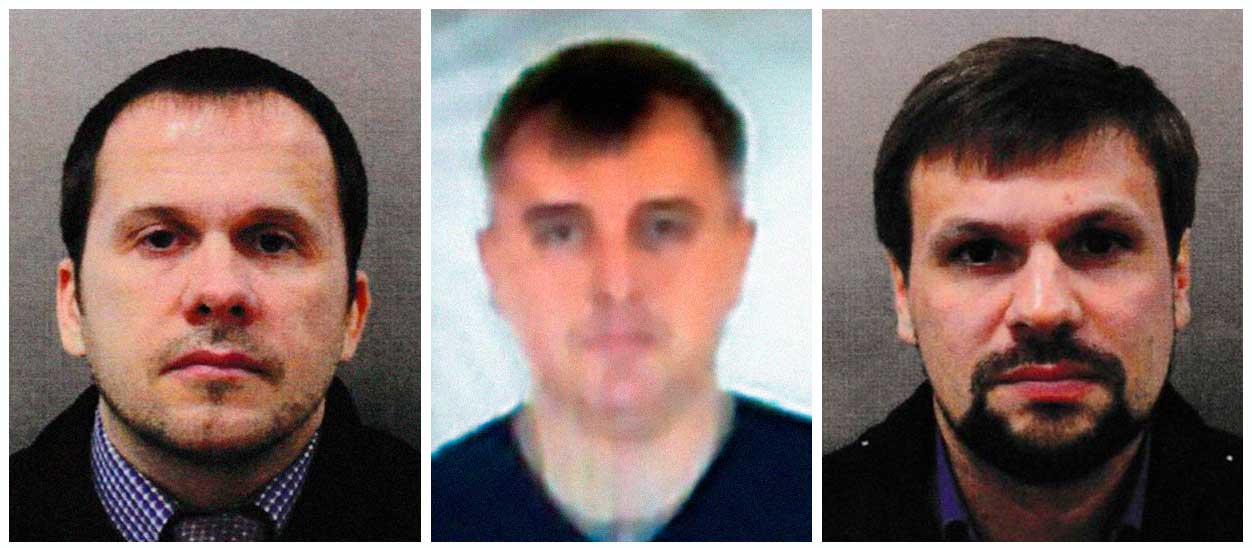
Petrov/Mishkin (left), Sergeev/Fedotov (center), Boshirov/Chepiga (right)
44-year-old Sturgess, a mother of three, died in July 2018, "suffocating" from a liquid in a bottle, which she thought contained perfume, but it was actually "Novichok" poison. The bottle was given to her by her boyfriend Charlie Rowley (Charlie Rowley), who found it in a trash bin.
In an official statement on the last day of the open sessions, the Director General for Defence and Intelligence of the Foreign Office, witness Jonathan Allen, stated:
"His Majesty's Government believes that this operation was personally sanctioned by President Putin". According to him, the risks associated with using "Novichok", the storage of which is prohibited by international conventions, in a NATO country "are so enormous" that it must have been sanctioned by the top of the Russian special services and government.
The lawyer for the family of the deceased Dawn Sturgess, relying on this testimony, even suggested to the presiding judge to summon Mr. Putin as a witness to give oral testimony during the investigation.
"He should not hide behind the walls of the Kremlin. He should look Dawn's family in the eye and answer the evidence presented to him". The presiding judge noted that this was an "interesting" proposal but expressed doubt that Putin would agree to come to testify. The lawyer had to agree with this.
HOW THE OPERATION WAS CONDUCTED
Three people from the GRU special operations unit "29155" arrived in London on March 2, 2018. Their plane tickets were booked the day before. The first person, who arrived at Heathrow under the pseudonym Sergey Fedotov, turned out to be Denis Sergeev, did not go to Salisbury. Having settled in the "Dolphin" hotel in the busy Paddington area in central London, he actively communicated by phone with Russia, presumably with his superiors.
The other two arrived at Gatwick Airport a little later and headed to the 2-star hotel City Stay in the inexpensive area of London (East End), using the pseudonyms Ruslan Boshirov and Alexander Petrov.
On the morning of March 3, on an unusually snowy Saturday (we remember the explanation in the interview with RT why the poisoners didn't reach Salisbury Cathedral — the slush), the police established that the three Russian operatives met for half an hour near Waterloo station, senior investigator of operation Catervan ("Catervan"), a top-secret investigation into the suspects, Dominic Murphy (Dominic Murphy) told the court.
Shortly before this meeting, Fedotov received three messages that the police called "operationally significant".
FIRST DAY OF THE OPERATION. RECONNAISSANCE
On March 3, Chepiga and Mishkin went by train to Salisbury for reconnaissance.
Arriving in the city at 14:24, Boshirov and Petrov examined the surroundings of the house where Sergei Skripal lived. Most of the day spent in Salisbury, the GRU officers did not communicate, apparently for the sake of conspiracy.
During the investigation, a photo was shown in which they look directly at surveillance cameras. This, the investigation believes, indicates that the GRU agents were mapping the coverage of surveillance cameras on the routes from the station to Skripal's house.
"REPROACHES TO THE BRITISH GOVERNMENT: SKRIPAL WAS NOT PROVIDED WITH SECURITY"
In the very first days of the hearings, criticism was voiced against the government, which failed to ensure the safety of Sergei Skripal, although it was obvious that he could become a target. The murder of Litvinenko apparently taught nothing, because, as it turned out at the hearings, the security measures for the former double agent, a GRU and British intelligence officer, were not observed. Sergei Skripal lived in Salisbury under his own name, he was on the electoral roll of his district, so anyone could easily obtain his address. However, Sergei Skripal himself, who gave written testimony from an unknown location, says he did not expect danger awaited him in the UK.
SKRIPAL DID NOT FEAR FOR HIS LIFE
Columnist for "The Times" Mark Urban, in a note he wrote in connection with the public investigation, recalls that a year before the poisoning in an interview he took with Skripal, he said he was not afraid of an assassination attempt and himself refused video surveillance and other security measures around his home. Then, writes Urban, he still did not believe in the corruption of the GRU and thought that Putin, agreeing to his exchange in 2010, had closed this case*.
(REFERENCE: *Sergei Skripal worked in the GRU, retired, was arrested in 2004 on charges of treason. He worked for British intelligence, and in 2010 he was exchanged for Russian spies detained in the USA, after which he moved to the UK. — NT).
During the investigation, Skripal's testimony was voiced, which he gave to the police after the poisoning. Speaking about the motives of the GRU, Sergei then said that the "reason No. 1" why the Kremlin wanted to kill him was that living in the UK, he gave consultations to British and other intelligence services.
In a written statement made specifically for the public investigation, Sergei Skripal laid the responsibility for the attempt on his life on the President of Russia, Vladimir Putin.
"I believe that Putin makes all the most important decisions independently, so, in my opinion, he must have at least given permission for the attempt on Yulia and me", — said Skripal, adding that this was his "private opinion".
DELIVERY OF POISON TO ENGLAND
The poison was flown in the luggage of GRU coordinator Denis Sergeev. How did the agents get the lethal dose of "Novichok", a deadly nerve agent developed by the Soviet Union?
The police believe that after inspecting Salisbury on Saturday, March 3, Boshirov and Petrov met again with Fedotov (Denis Sergeev) in the Bond Street area in central London, where he likely handed them a gray backpack containing "Novichok".
Boshirov and Petrov arrived in the country only with hand luggage, and this backpack does not appear in the airport surveillance camera records. Fedotov apparently checked in the load with the poison as baggage, which "Aeroflot" delivered to London.
On the evening of the same day (March 3), Boshirov and Petrov made the final preparations in their hotel, leaving insignificant traces of "Novichok", which were discovered when samples were taken from their room, and on Sunday, March 4, they went again to Salisbury.
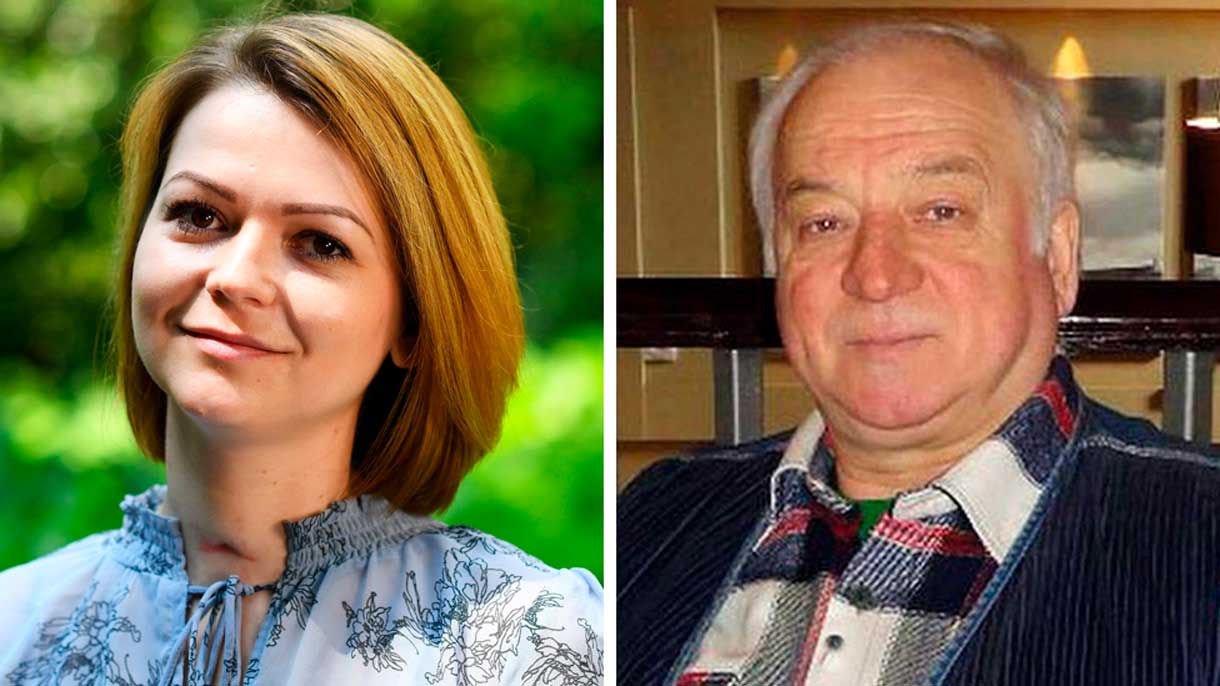
Yulia Skripal and Sergei Skripal, photo Reuters/BBC
Police and experts from Porton Down, the British military research laboratory, told the investigation that the handle of the front door of Skripal's house was contaminated on March 4, 2018, between 12:00 and 12:15. The Skripals, leaving the house, contaminated their hands with the poison, closing the door.
After applying "Novichok" to the door, Boshirov and Petrov (Mishkin and Chepiga) returned to the city center, where surveillance cameras "lost" them for 33 minutes. It is during this time, according to the police, they could have used a portable bag sealer, a laminator, to seal the bottle with pseudo-perfume Nina Ricci, which Dawn Sturgess "suffocated" with, and the applicator. By the way, according to the investigation, it became known that the bottle with "Novichok" that Dawn Sturgess opened contained enough nerve agent to kill thousands of people.
THE ADVENTURES OF THE POISON BOTTLE
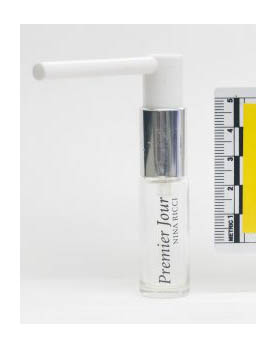 From the very beginning of this story, it was unclear how the bottle with the poison remained unnoticed in a trash bin for a whole 4 months? From what was voiced during the public investigation, it finally became clear what happened to this bottle. Why did it take 4 months between the Skripal poisoning and the moment the bottle ended up in the hands of Dawn Sturgess, 13 kilometers from Salisbury, in the town of Amesbury? The fact is that after learning about the circumstances of the bottle's discovery from Charlie Rowley, who found the bottle while rummaging through the trash and gave it to his girlfriend Dawn, believing it contained perfume, the police considered his testimony unreliable. In fact, the police investigating the murder believe that Charlie picked up the bottle shortly after Mishkin and Chepiga smeared the door handle of Skripal's house, on the same day, March 4. This was stated at the hearings by the investigator of the secret operation codenamed Catervan) Denis Murphy: "Most likely, Charlie Rowley found the bottle with the perfume containing "Novichok" on Sunday, March 4, 2018".
From the very beginning of this story, it was unclear how the bottle with the poison remained unnoticed in a trash bin for a whole 4 months? From what was voiced during the public investigation, it finally became clear what happened to this bottle. Why did it take 4 months between the Skripal poisoning and the moment the bottle ended up in the hands of Dawn Sturgess, 13 kilometers from Salisbury, in the town of Amesbury? The fact is that after learning about the circumstances of the bottle's discovery from Charlie Rowley, who found the bottle while rummaging through the trash and gave it to his girlfriend Dawn, believing it contained perfume, the police considered his testimony unreliable. In fact, the police investigating the murder believe that Charlie picked up the bottle shortly after Mishkin and Chepiga smeared the door handle of Skripal's house, on the same day, March 4. This was stated at the hearings by the investigator of the secret operation codenamed Catervan) Denis Murphy: "Most likely, Charlie Rowley found the bottle with the perfume containing "Novichok" on Sunday, March 4, 2018".
This is also indicated by the surveillance camera footage: one of the cameras shows Sergei and Yulia Skripal sitting on a bench in the center of Salisbury. They are feeling worse: a few minutes later, passersby came to their aid.
Nearby, another camera captured one of the city's drug addicts rummaging through trash bins in search of items to sell. This is Charlie Rowley, and it seems it was then that he found the "perfume" which he gave to his girlfriend Dawn 4 months later.
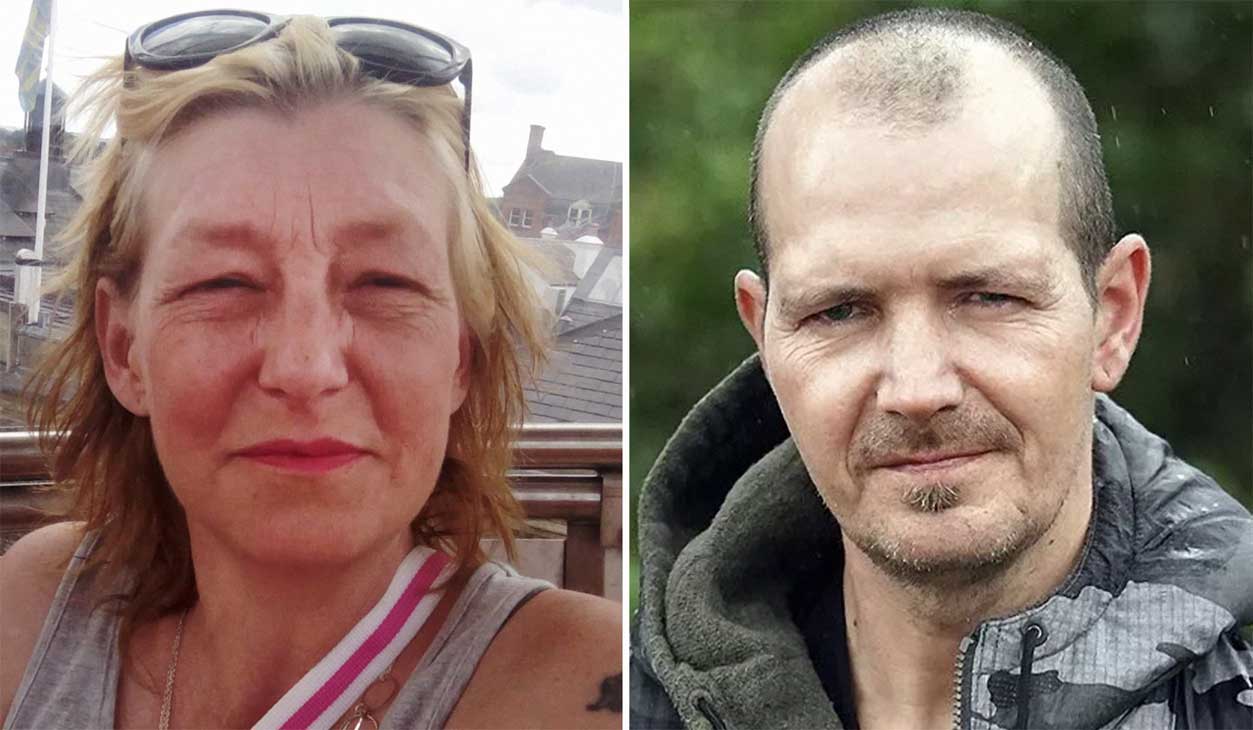
Dawn Sturgess, Charlie Rowley. Photo: BBC, Roland Leon/Sunday Mirror
The police do not trust Charlie's testimony, believing that due to drug abuse and as a result of "Novichok" poisoning, he has memory lapses. Charlie was also treated for poisoning, he spilled a few drops of the liquid on his hands when opening the sealed package with the pseudo-perfume.
Dawn Sturgess's mother told the investigation that Dawn sprayed herself with the "perfume" the day before meeting her daughter. It can be assumed that if she had not lost consciousness on the street but had managed to meet her daughter, not only the daughter but also a large number of people around could have been harmed or even killed.
THE BRITISH UNDERESTIMATED THE DANGER
"FIVE YEARS BEFORE THE ATTEMPT, RUSSIAN SPECIAL SERVICES SHOWED INTEREST IN YULIA SKRIPAL'S CORRESPONDENCE"
Although in his testimony to the police, Sergei Skripal said that "he never thought that the Russian regime would try to kill him in the UK", in April 2018, a letter from then-government national security adviser Sir Mark Sedwill to the NATO Secretary General was published, stating a "cyber interest" in the Skripals since 2013, that is, five years before the poisoning. The letter stated: "We have information indicating Russian special services' interest in the Skripals at least since 2013, when email accounts belonging to Yulia Skripal became a target for GRU cyber specialists".
OPERATION CATERVAN. How the Real Names of the Killers Were Revealed
The pseudonyms of the suspects, as already mentioned, were revealed by journalists from Bellingcat using open sources.
The police, having access to all the data — from the visa application forms of the suspects for numerous European trips on GRU unit "29155" assignments to their registration on the booking.com website, made many interesting discoveries. As it turned out, back in 2011, Boshirov sent money from his GRU account to Vladimir Chepiga's father, using his pseudonym "Boshirov". In the visa application forms, all three suspects indicated the places and dates of birth of their real parents, although they themselves used pseudonyms. Another blunder by the GRU agents: as proof of employment, all the suspects used the same front companies.
These mistakes helped the police across Europe uncover several operations of the "29155" unit, including sabotage at a Czech arms factory in 2014*.
(REFERENCE: In 2014, in the village of Vrbetice, 350 kilometers from Prague, explosions occurred at two ammunition depots, resulting in the deaths of two people. Seven years later, the little-known incident outside the country turned into an international scandal when Czech authorities accused Russian special services of involvement in the explosions. — NT).
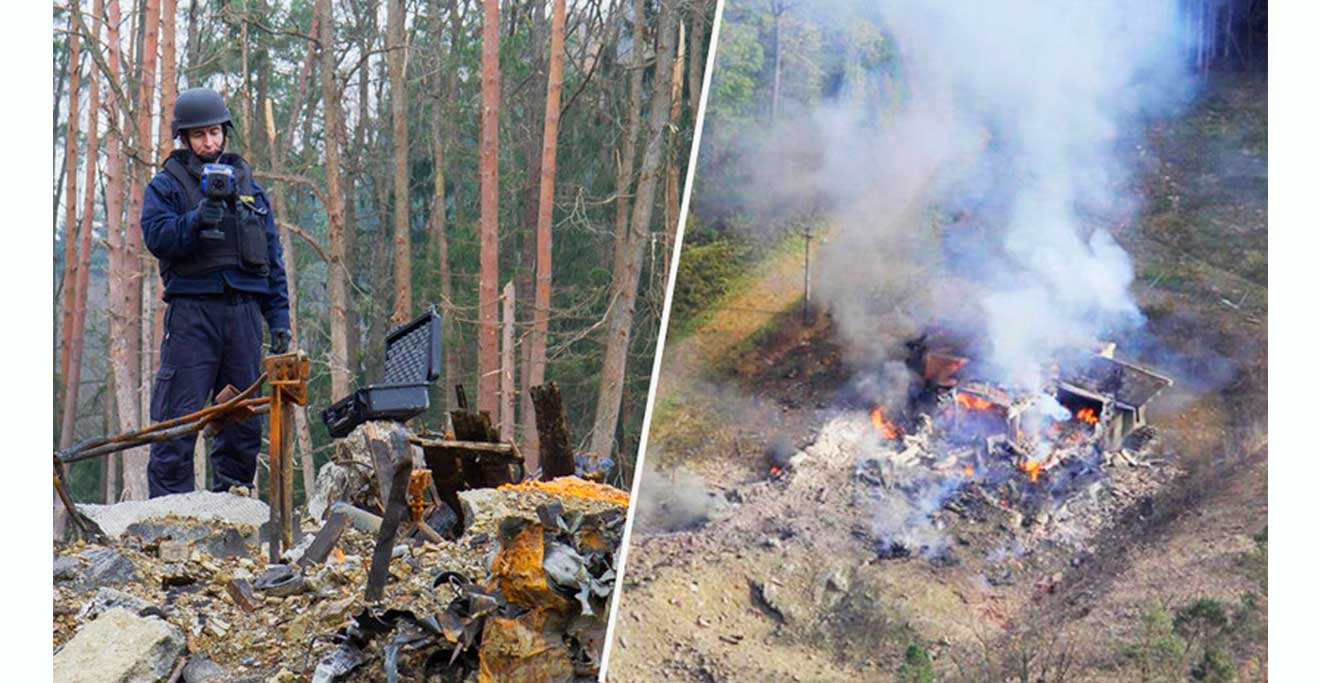
The site of the explosions in the village of Vrbetice. Photo: policie.cz
In hindsight, it is difficult to understand how people with such sloppy "legends" received British visas.
During the investigation, shortcomings were identified in the work of local health authorities, which did not foresee the second incident (the poisoning of Dawn Sturgess) after the March poisoning, as well as poor communication between the hospital where Dawn was admitted and the military research laboratory Porton Down (Porton Down) after her hospitalization. However, it is far from certain that she could have been saved. Testimonies from a scientist at Porton Down indicate that she received a dose large enough to kill several people. According to Charlie Rowley, she applied the "viscous liquid from the bottle" to her wrists and rubbed it in, as he recalled in his testimony. Moreover, the doctors treating Dawn initially decided that she was a drug addict and did not associate her poisoning with the events that occurred in March of the same year, that is, 4 months earlier.
The open part of the investigation is completed. In the coming months, hearings will be held in closed sessions, as national security issues will be discussed. The final report is expected to be presented to the government and the public in early 2025.